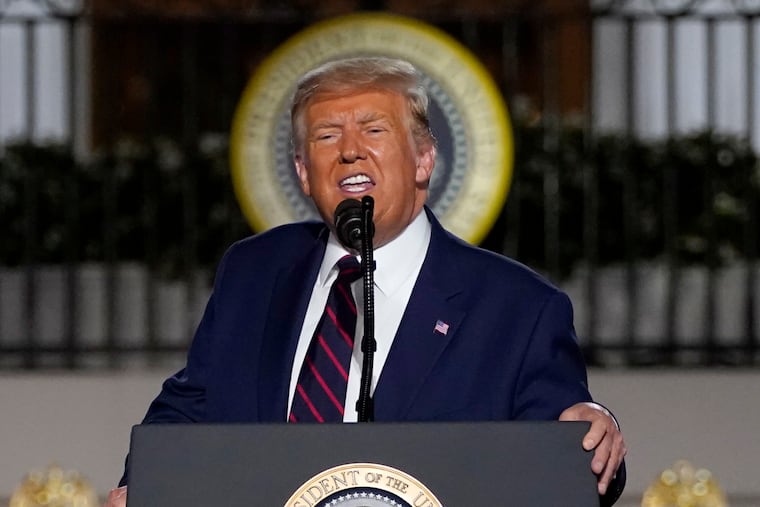As both sides scream ‘dementia’ over presidential candidates, which one speaks more clearly? An analysis. | The Angry Grammarian
Assessing Joe Biden's and Donald Trump's remarks reveals a surprising amount about their command of the English language.

Who is better with words: Donald Trump or Joe Biden?
Depending on which candidate you support, the answer seems crystal clear; both the left and right extremes of the internet don’t hesitate to cry “dementia!” on the opposing candidate. But if you want evidence, go to their words.
Last year Factba.se analyzed all of the unscripted words spoken by the last 15 U.S. presidents in the first 986 days of their presidencies. (Why 986? Because their analysis was on the 986th day of Donald Trump’s presidency, and statisticians, like grammarians, crave consistency.) They used the Flesch-Kincaid grade-level test, which the U.S. government uses to ensure readability of government documents. It calculates the number of words per sentence and the number of syllables per word, which together determine the grade level that someone is speaking or writing at.
» READ MORE: Trump says in Philly town hall: ‘I didn’t downplay’ coronavirus, ‘I up-played it’
The results were somewhat surprising. Barack Obama, whom conservatives love to tag as elitist, was right in the middle of the pack, speaking at an eighth-grade reading level. During George W. Bush’s presidency, he was consistently labeled a simpleton, but he was only 11th on the list, scoring higher than both his dad and FDR. At the top of the list? Herbert Hoover, who spoke at an 11th-grade level through the Great Depression. Trump ranked by far the lowest, speaking at a fourth-grade reading level.
We don’t have similar analysis for Biden’s unscripted remarks, but we have some useful data. In 2008 the Global Language Monitor analyzed Biden’s and Sarah Palin’s sentences in their vice presidential debate, and found that Biden spoke at an almost eighth-grade level, which would place him toward the bottom of the presidential list: between Bush 41 and FDR, though still higher than Trump. But in that same vice presidential debate, Palin — whose nonsensical, grammatically catastrophic meanderings became, thanks to Tina Fey, the most memorable thing about her — scored a high 9.5, which would rank her near the top of the presidential list, just below JFK.
And therein lies the problem inherent in the methodology. As anyone whose high school English papers were marked up in red pen with the words run-on can tell you, longer sentences aren’t necessarily smarter.
And just because you use bigger words doesn’t prove you know what those words mean. Merriam-Webster tracks when lookups of certain words increase. Earlier this month, Biden’s use of foment (“[Trump] can’t stop the violence because for years he’s fomented it”) and obsequious (“What is he so afraid of Vladimir Putin of? … It’s almost obsequious”) caused lookups of both words to spike. Biden is typically thought of as a plainspoken orator, yet when he uses $10 words like foment and obsequious, people expand their vocabularies.
» READ MORE: What a group of Pa. voters thinks of Trump, Biden, protests, looting, and the conventions
On the other hand, when lookups of Trump’s words spike, it’s often because he’s misused them. Some of Merriam-Webster’s Trump-induced jumps over the last year have included per capita (“And you know, when you say per capita, there’s many per capitas,” he remarked about COVID testing); sarcastic (in regard to his comments about using bleach to kill coronavirus, “I was asking a question sarcastically to reporters like you just to see what would happen”); lynch (on his impeachment: “All Republicans must remember what they are witnessing here — a lynching”); and coup (“what is taking place is not an impeachment, it is a COUP”).
In each case, readers searched to see if Trump used the word correctly. In each case, he hadn’t.
By each of these imperfect metrics, Biden still comes out atop Trump. But don’t take my word for it: Read the two men’s words and decide for yourself who has stronger command of the English language — lest we inadvertently determine that what the world needs now is another Herbert Hoover.
The Angry Grammarian, otherwise known as Jeffrey Barg, looks at how language, grammar, and punctuation shape our world, and appears biweekly. Send comments, questions, and polysyllables to jeff@theangrygrammarian.com.